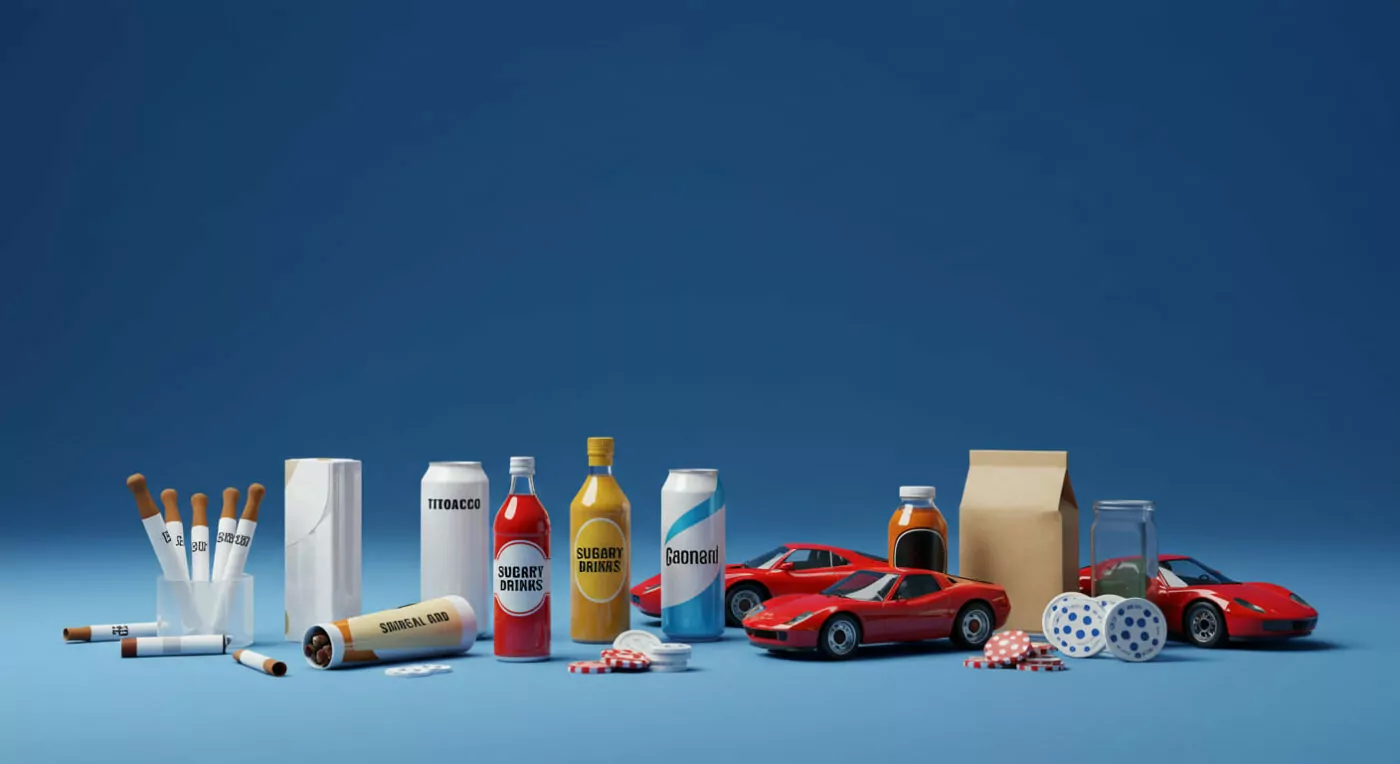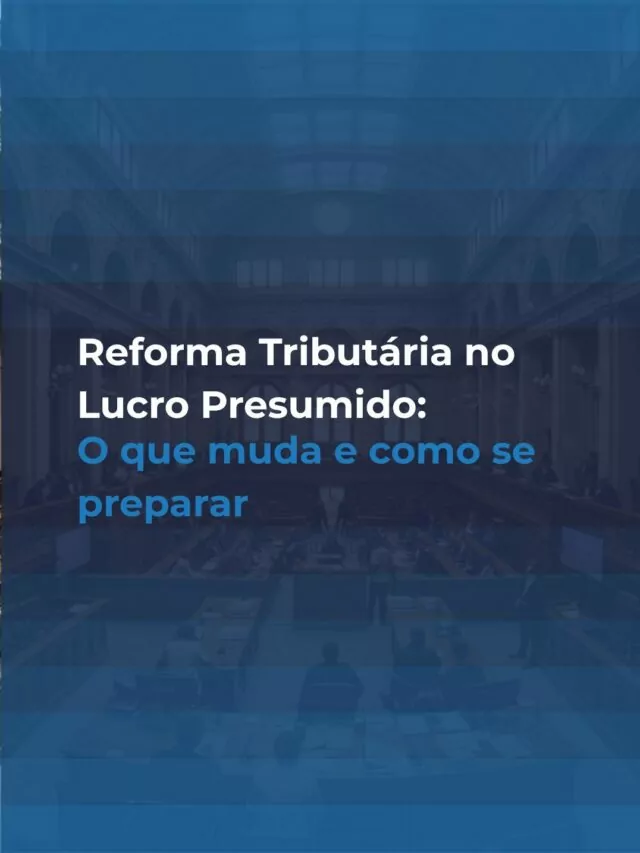A tax reform approved in Brazil is rewriting the rules of the game for companies and consumers - and one of the most controversial and impactful changes is the creation of the so-called Sin Tax. This new tax, which promises to hit the pockets of those who manufacture, sell or consume products such as cigarettes, alcohol and soft drinks, raises a number of questions:
Does the measure have a real focus on public health or is it just another way of raising revenue? And most importantly: how will industries adapt to this new scenario?
This article is designed especially for companies in the industry that produce or sell products subject to the new Selective Tax. Here, you will understand what this tax is, which goods will be affected, how much it will cost, when it comes into force and what the practical impacts will be for your business. More than explaining the law, the aim is to make a critical reading of the scenario and point out the risks, challenges and opportunities arising from this new taxation. If your company deals in alcoholic beverages, cigarettes, soft drinks, mining or vehicles, this content is essential.
Do you know what the 'Sin Tax' is? Do you want to understand how it will affect your industry and consumers' pockets? Ana and Rodrigo explain everything: from the tax rate to the consequences for sectors such as tobacco, alcohol, sugary foods and even fuels. Strategy, impacts and critical vision in a direct and sharp conversation. Hit play!
What is the Sin Tax?
O Sin Taxofficially called Selective Tax (IS), is a new tax created in the Brazilian Tax Reform (Constitutional Amendment 132/2023) and regulated by Complementary Law 214/2025.
It is a surcharge on products and services considered harmful to public health or the environment - hence the nickname "sin tax". Unlike the new general taxes on consumption (IBS and CBS)The IS has the character selective and extra-fiscalIn other words, its main purpose is to discourage consumption of these specific items through an additional charge.
In other words, it's not just another tax to raise revenue: it comes with the discourse of changing consumer behaviorby penalizing "harmful" products with higher taxes.
In practical terms, the Selective Tax will be a federal tax, levied just once in the chain (typically in the initial production, extraction, import or marketing of the good) and will not apply cumulatively on other consumption taxes

This tax has partly replaced the former extrafiscal function of the IPI (Tax on Industrialized Products) for certain products: while the IPI will be zeroed out in most cases from 2027, the IS takes on the role of heavily taxing "sinful" products (such as cigarettes, alcohol, etc.) that previously paid a high IPI. In short, the Sin Tax is a tax tool new within the reform package, targeting specific sectors with the declared aim of promoting public health and environmental protection.
This tax has partly replaced the former extrafiscal function of the IPI (Tax on Industrialized Products) for certain products: while the IPI will be zeroed out in most cases from 2027, the IS takes on the role of heavily taxing "sinful" products (such as cigarettes, alcohol, etc.) that previously paid a high IPI. In short, the Sin Tax is a new tax tool within the reform package, targeting specific sectors with the declared aim of promoting public health and environmental protection.
Which products will be affected?

The list of products subject to Excise Duty is exhaustive and was defined in the article 409 of LC 214/2025. They are basically goods and activities associated with health or environmental risks. The main items that will be taxed by IS include:
- Tobacco products - Cigarettes, cigars and other smoking products.
- Alcoholic drinks - All alcoholic drinks, from beers to spirits.
- Sugary drinks - Soft drinks and other non-alcoholic drinks with added sugar.
- Polluting motor vehicles - Cars, motorcycles, boats and aircraft powered by fossil fuels (transport items with high emissions).
- Mineral goods - Ores in general and fossil fuels such as oil and natural gas (taxed on extraction).
- Betting and gaming - Prediction contests, betting (lotteries) and fantasy sports (online sports betting games).
This list covers both products traditionally seen as "sinful" from a health point of view (tobacco, alcohol, sugar) and items linked to environmental damage (polluting vehicles, mineral extraction).
It's worth notingDuring the regulatory process, it was discussed to also include ultra-processed foods high in sodium, saturated fats and sugar on the list. Health sectors argued in favor of taxing these foods, but the food industry reacted strongly.
In the final approved text, the ultra-processed foods (snacks, sausages, etc.) were left out, with with the exception of sweetened drinks (soft drinks), which will in fact be taxed by IS. In other words, there will be no sin tax on cookies, ice cream, frozen foods and the like - at least for the time being.
This exclusion has eased the burden on the food sector, but keeps the spotlight on sugary drinks, given the evidence of their impact on health (obesity, diabetes).
Another important point: electricity and telecommunications will not be burdened by ISDespite the fact that these are universal services, care was taken to exclude these sectors from the sin tax, in order to avoid making electricity and internet more expensive for the population.
Essential items such as fuels for general use (gasoline, diesel) also remain outside the scope of IS - instead, fuels will have a specific tax regime within the new model, but not via excise duty. Therefore, the focus remains on the products listed above, which are considered non-essential or harmful from some point of view.
Rates: how much tax will be charged?
The The exact rates of excise duty for each category have not yet been definitively established. - they will have to be set by specific ordinary laws or by Executive regulations within the limits laid down. However, there are already projections and parameters indicated during the reform discussions. The general logic is: the more harmful the product, the higher the ratefollowing the principle of essentiality/internalization of externalities.
To give us an idea, proposals under discussion suggested the following percentages of IS on the value of the product in 2027:
- Cigarettes and other smoking products: 250% (i.e. a tax equivalent to 2.5 times the factory price of cigarettes!).
- Alcoholic drinksbetween 46% and 62%This varies according to the alcohol content - stronger drinks pay more tax than those with a lower content.
- Soft drinks and sugary drinks: 32% on the value of the product.
- Mineral goods (iron ore, oil, gas, etc.): 0.25% on the gross value extracted.
These figures demonstrate the nature heavily taxed certain sectors. Cigarettes, for example, would have massive additional taxation (not unlike the current scenario, in which the total tax burden on cigarettes already exceeds 80% of the consumer price).
Alcoholic drinks would also face a significant, albeit graduated, increase - possibly differentiating between beers, wines and spirits. In the case of soft drinksThe extra 32% of tax would make soft drinks much more expensive, reinforcing the incentive for consumers to look for alternatives (such as zero-sugar drinks, which presumably don't fall under the definition of a "sugary drink").
Now polluting vehicles and other items have yet to be disclosed, but expect something close to the old IPI rates for cars (which ranged from ~7% to 25%, depending on the engine) or even higher, given the environmental appeal.
For the mining sectorThe ceiling established in the complementary law was 0.25% on the value of the ore or fossil fuel - a low rate in percentage terms, precisely because the intention here is more to capture some of the income from the natural resource (and compensate for the loss of the Manaus Free Trade Zone's IPI) than to totally discourage extraction.
It is important to remember that, according to the Constitution, exports cannot be burdened by this tax. There was even a controversy: initially they wanted to charge IS on mineral extraction even if the product was exported, but this was vetoed by the Executive on the grounds that it contradicted export immunity. Thus, mining and oil companies will pay IS only on domestic sales.
In short, sin tax rates vary dramatically depending on the product. Public health items (cigarettes, alcohol, soft drinks) tend to have sky-high taxeswhile strategic/exportable goods (minerals, oil) remain with symbolic fees.
This differentiation reflects both health considerations and economic and political pressures (after all, heavily taxing minerals could harm one of the engines of the national economy). It is worth emphasizing that these percentages can still change, since the complementary law only gave guidelines and Congress could adjust the rates before 2027 to calibrate the effect and the desired collection.
When does the tax start to apply? (Transition and dates)
When will companies have to pay the Selective Tax? According to the tax reform timetable, the IS comes into force on January 1, 2027. The year 2026 will be a transition period, but focused on the new CBS and IBS taxes (which will be tested in a real environment, but without actual collection, only simulation on invoices). During 2026, the Selective Tax will not be applied yetThis is because current taxes (such as IPI) will continue to apply during this test period.
The big turning point comes at the beginning of 2027This was followed by the definitive abolition of PIS and Cofins and the reduction of the IPI rate to zero (except to protect the Manaus Free Trade Zone), the Sin Tax begins to be levied. In other words, all taxable events occurring from Jan/2027 onwards involving products on the IS list will already be subject to this new extra tax. Companies in the sectors affected will then need to include the Selective Tax in the price and calculation of their obligations from that moment on.
And what about the transition for those who already pay other taxes? In practice, the IS replaces the function that the IPI performed on these specific products. In 2027, the IPI drops to 0% (zero) in most cases, so the extra-fiscal burden migrates to the Selective Tax.
For the company, it means that instead of paying IPI on cigarettes or drinks, for example, it will pay IS. There is no progressive phasing in of the IS over several years - unlike the IBS, which will grow gradually from 2029 to 2032, the Selective Tax already enters 2027 in its fullness.
Obviously, the government can adjust the rates over time (even by presidential decree, as long as it stays within the legal limits, which has generated criticism about legal uncertainty). But there is no provision for a "half-rate" period or anything like that: the rule of the game changes all at once for selected sectors in 2027.
Beyond 2027, other relevant datesFrom 2029, the old ICMS (state) and ISS (municipal) taxes will gradually be reduced, while the IBS will rise, completing the general transition of the system in 2033. However, this impacts all sectors indiscriminately.
Specifically for "sinful" products, the crucial milestone is 2027When these goods become a very different tax structure (CBS + IBS + IS, without PIS/Cofins, without IPI). Companies therefore have until the end of 2026 to adapt - be it adjusting billing systemsbe it reviewing price and stock policies to the new tax reality.

Who will be directly impacted?
The Sin Tax mainly affects industrial companies that manufacture, import or market the products listed. In focus, we have some very specific industrial subsectors:
- Tobacco industry: Factories making cigarettes, cigars, cigarillos and other tobacco products will be hit hard. These companies, which already operate with a high tax burden and regulations, will face a new tax of considerable weight. Importers of foreign cigarettes will also be affected.
- Alcoholic beverages industryBreweries, wineries, distilleries and drinks manufacturers in general will now have to pay IS on their products. From large brewers to small producers of artisanal cachaça, everyone who sells alcoholic beverages will fall within the scope (possibly respecting differences in alcohol content).
- Soft drinks industryThis niche includes manufacturers of soft drinks, sweetened nectars, boxed juices with added sugar, sweetened ready-made teas, energy drinks with sugar, etc. Beverage companies that have "regular" (sugared) versus "zero" lines should prepare for different tax treatment between them - the sugared lines paying IS, the diet/zero versions escaping it.
- Automotive and vehicle sectorAutomakers of cars, motorcycles, trucks, boat manufacturers and executive jets - especially those powered by gasoline, diesel or aviation kerosene - will be subject to the sin tax on the sale of these goods. This is a significant impact for the national automotive industry, which was already adapting to incentives for electric cars: now there will be an explicit disincentive for traditional internal combustion vehicles.
- Mining and oil & gasMining companies (iron, bauxite, etc.) and oil/petrochemical companies will also feel the effect, even though the rate is low. When extracting ore or producing oil for the domestic market, IS will be levied - so giants like Vale, Petrobras and others in the industry will have this component added to their production costs.
- Lottery and betting companies: Operators of lotteries, sportsbooks and fantasy sports will have to pay tax on their revenue. This is a peculiar segment - many are state entities (Caixa Econômica, state lotteries) or digital platforms. In any case, the tax impacts the gaming and betting sector by encumbering each operation/wager made.
For these companies, the Selective Tax represents increases in the tax burden and additional ancillary obligations. They will have to adapt in terms of electronic invoice system (NF-e) - for example, correctly identifying when a sale involves a product subject to IS and highlighting it in accordance with future tax guidelines. There is also an impact on cash managementAs IS will be calculated and paid monthly, companies need to make provision for this significant amount to be paid.
Another group indirectly impacted are the retailers and distributors of these products, as well as the end consumersBut the focus here is on industries. In the case of manufacturers, they will face difficult decisions: absorb part of the cost of the tax (reducing margin) or pass it on in full in the price? Each sector will have different dynamics depending on the elasticity of the product and market competition, but without a doubt the profitability and sales volume of these companies will be at stake.
Expected impacts for the industrial sector
From the point of view of the industries affected, the new sin tax brings with it a series of new benefits. challenges and potential practical effects:
Rising costs and prices: The imposition of a very high additional tax in some cases (see 250% on cigarettes) means that the tax cost per unit will skyrocket.
Companies will probably pass on a large part of this cost to the final price of the product - after all, few companies can absorb a tax that multiplies the price internally.
Raquel Torres - Tax Consultant
Thus, a significant increase in price of products such as cigarettes, alcoholic drinks and soft drinks to the consumer. This could put pressure on inflation in certain categories and reduce sales in volume. For industry, lower volume could mean using idle capacity, reducing investment or even cutting jobs in the medium term, if the drop in consumption is significant.
- Product mix review and innovation: Companies can react adapting your portfolio. For example, beverage manufacturers can accelerate the production and marketing of versions "zero sugar" or healthy drinks to avoid taxation, shifting the focus away from traditional sugary products. Food industries, if included in the future, could reformulate products to reduce harmful ingredients and avoid the "sinful" label. In the automotive sector, the existence of IS on combustion cars acts as an indirect incentive for automakers to invest more in electric and hybrid vehicleswhich will probably not be taxed by IS (because they are not local pollutants). In short, tax policy can shaping industrial strategieswho produces "sins" can try pivot for more "virtuous" and less taxed products.
- Passing on to consumers vs. falling demandThe demand for the products affected can react in different ways. Some are more elastic (soft drinks - consumers can reduce consumption or switch to natural juice, for example), while others are notoriously inelastic (cigarettes - addicts tend to keep buying them, even if they are expensive). If the price is passed on in full, some reduction in consumption of superfluous items is expectedThis has a direct impact on companies' turnover. In the case of goods with a strong dependency or habit, consumption can be maintained despite the high price - which means more revenue for the government, but consumers footing the bill. There is a risk of loss of market share to informal or illegal competitorsFor example, in the cigarette sector, Brazil already suffers from a high rate of smuggling of cheaper foreign brands (not taxed domestically). If the price of legal cigarettes goes up even more, the competitiveness of illegal products increasesThis is detrimental to formalized companies and generates a encouraging the underground market. The same could happen with drinks (home-made or smuggled) if the price difference becomes tempting.
- Competitiveness and foreign marketsFor exportable products (minerals, oil), although IS is not levied on exports, will be levied on internal sales and possibly inputs. This may make it slightly less attractive to sell on the domestic market than to export. Intensive sectors such as mining can argue that any additional costs reduce margins and can scare away investment - especially if other competing countries don't apply a similar tax. In the automotive sector, a Brazilian car with a high tax rate can lose its domestic market to an equivalent imported car if there is a tax loophole (although in theory the imported car also pays IS when it enters the country). Thus, the effect on competitiveness needs to be monitored: IS can create market distortions if it is not well calibrated, either by favoring alternative products (which may even be intentional) or by favoring irregular practices.
- Need for compliance and operational adjustmentFrom an operational point of view, companies will have to invest in tax systems and controls to correctly calculate and collect Excise Duty. New fields on electronic invoices are being created to indicate the incidence of IS. There will also be an obligation to separate monthly calculation of this tax, without the right to compensatory credits (unlike the IBS/CBS, the IS does not generate a credit for the next stage). This requires training for the company's tax team and possibly the adaptation of box - given that you won't be able to use input credits to write off IS, it's a "dry" outlay. Smaller companies in affected sectors may find it more difficult to adapt, as it is an additional item in Brazil's already complex tax management.
In short, the impact on the industrial sector will be a balance between the public objective (discouraging harmful consumption) and the business effects (increased costs, market reorganization). Companies will need to be agile to mitigating risks - investing in alternative products, production efficiency and combating illegal trade - while managing consumer perception of likely price increases.
Stated objectives vs. possible effects: a critical view
O official discourse around the Sin Tax emphasizes noble goals: promote public health, reduce negative externalities and encourage sustainable practices. The idea is that by making products like cigarettes, alcohol and soft drinks more expensive, people will consume less, reducing illnesses; and by taxing polluting items, it will encourage clean technologies and less environmental damage. In addition, the formulators point out that the collection of this tax could financing health and environmental programsand reinvesting the money for the good of society. In theory, it would be a kind of "win-win": less harmful consumption, and the little consumption that remains generates resources to repair the damage caused.
In practice, however, there is a lot of controversy whether these results will be achieved - and whether there were no other motivations behind the tax. First, many of these goods have inelastic demandespecially among low-income consumers. This means that even with price increases, consumption doesn't drop significantly, as these are products that are ingrained in everyday life or cause addiction (as in the case of cigarettes).
In such cases, the main effect can be increase in revenue (people continue to buy and just pay more tax), without the counterpart of a substantial improvement in public health. This raises the criticism that the government is using the health/environment argument to, in fact, compensate for lost revenue from other taxes and fatten the coffer. Experts point out that, in fact, the IS will help make up for the loss of the IPI and taxes that were reduced in the reform, with a strong tax collection component disguised as public virtue.
There is also the question of tax justice and social impacts. Items such as cheap drinks and cigarettes are proportionally more consumed by the lower income classes.
Thus, a high tax on these goods acts in a way that regressiveThe cost of health care is higher (at % of income) for the poorest - precisely the segment with the least access to health care, ironically.
Some argue that this type of tax punishes the consumer instead of taking direct educational or restrictive measures (e.g. anti-smoking campaigns, bans on sales to minors, etc.). In other words, charging for "sin" instead of preventing it. From the point of view of companies, this logic can also be seen as penalizing legal economic sectors that generate jobs and income, without necessarily tackling the root of the problems.
Another worrying side effect already mentioned is the encouraging informality and illegality. When there is a great price differential caused by taxes, creates opportunities for smugglers and tax evaders. Brazil is already experiencing this with cigarettes (it is estimated that more than half of the cigarettes consumed in the country are illegal, coming from Paraguay).
With even higher taxes, the risk is that this illicit market will intensify, undermining the goal of health (after all, the consumer can resort to cheaper illegal products, often of even worse quality) and damaging industries formal which lose market share. Combating this effect will require increased supervision and greater public spending - more customs operations, police and punishment for fraud. In other words, the sin tax can generate a cat and mouse cycleThe government raises taxes to discourage tax evasion, but ends up having to spend more on inspection to curb tax evasion and smuggling.
On the environmental side, the outcome will also depend on other factors. Taxing combustion cars alone, does not guarantee that consumers will migrate to electric cars - if there is no affordable supply of streetcars or quality public transport, people may simply keep their old vehicles for longer (which worsens pollution) instead of buying a tax-burdened zero km.
For the measure to result in environmental improvements, it may need to be accompanied by incentives for clean alternatives (e.g. subsidies for electric cars, investment in public transport). Otherwise, the IS just becomes an extra toll for those who need a car, with no real reduction in emissions in the short term.
Of course it's not all criticism. From a public health point of view, there is international evidence that taxes on sweetened drinks reduce sugar consumption and encourage the reformulation of products (as in the case of Mexico, the United Kingdom, etc.).
In Brazil, even if the tax is not a silver bullet, it is part of a set of actions (warning labels, educational campaigns, advertising restrictions) that can together change habits over the years. In addition, if the revenue is really earmarked for health systems (treatment of diseases related to smoking, alcohol, obesity) and environmental projects, society can benefit from the return of these funds - although, as we have seen, there is skepticism as to whether this will actually happen in a transparent way.
Conclusion
The Sin Tax is a bold and controversial measure. From the point of view of companies in the industrial sector, it represents a new regulatory and financial challengeand can profoundly alter entire markets. Although it has laudable stated objectives, its real economic effects may differWe can see price increases, consumption rearrangements and even market distortions such as smuggling and loss of international competitiveness.
It remains to be seen how implementation will go in 2027 and whether the the final balance will be positive in terms of health/environment or if the collection nature will prevail. Companies, for their part, are already on the alert - preparing strategies to adapt to this "new era" of taxation, while critically evaluating whether the medicine might end up being more bitter than the sin it's intended to cure.
Have you heard of CLM Controller accounting?
- We offer personalized serviceThis mitigates the impersonality common in some offices;
- We have teams segmented by nicheguaranteeing specific expertise for your sector;
- We use cutting-edge technology for integration and efficiency;
- We have over 40 years of experienceIt conveys confidence and legal certainty.
If your company is looking for efficiency and wants to focus on what really matters, you can count on CLM Controller contabilidade.








